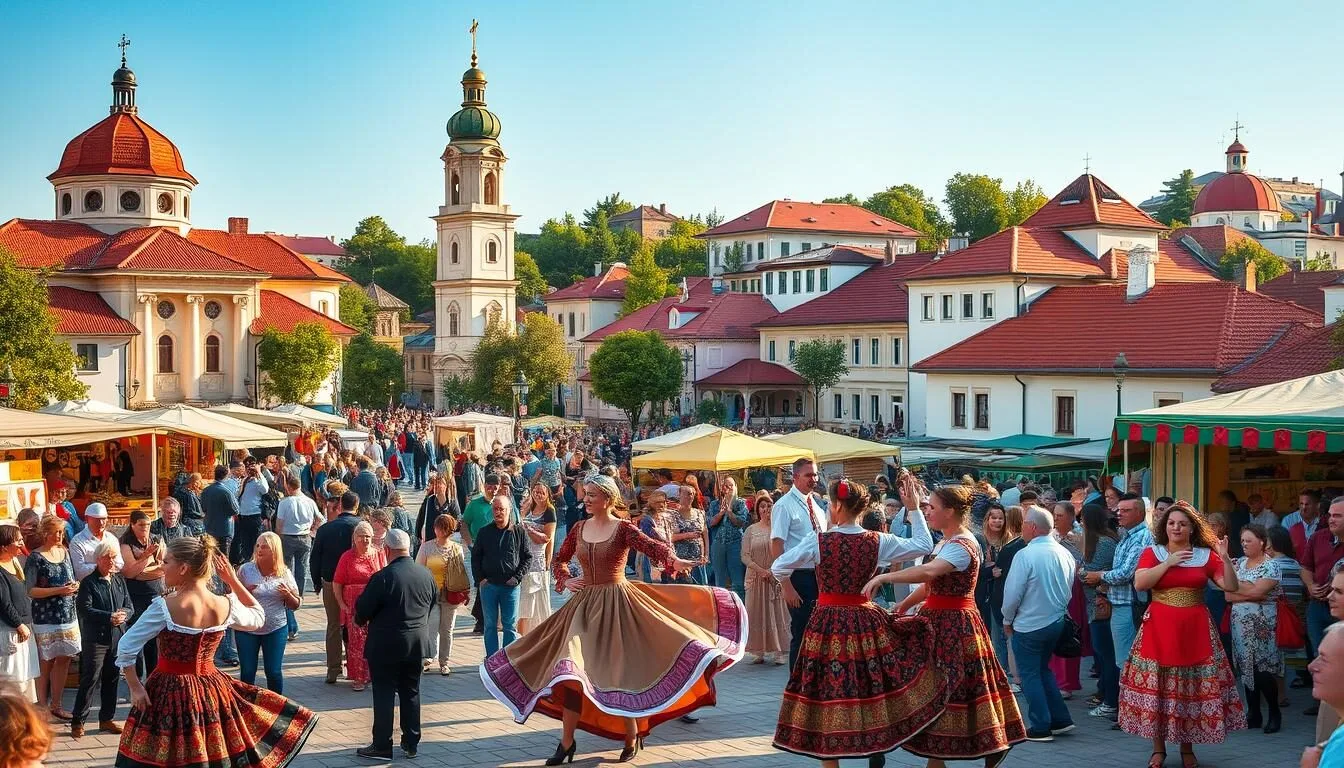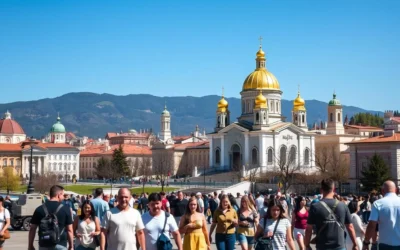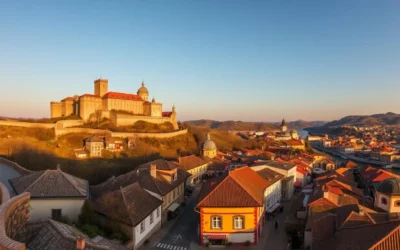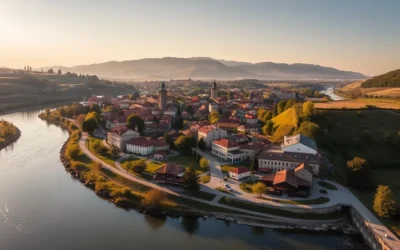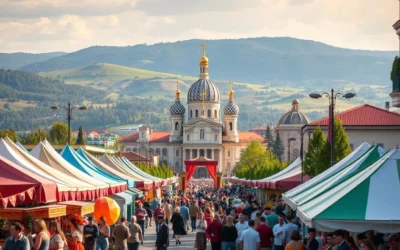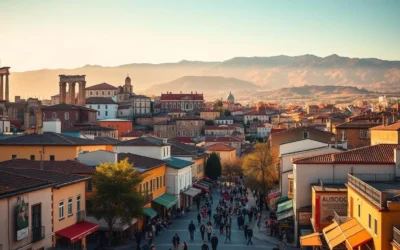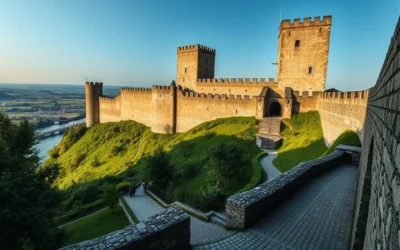✓ Accommodations✓ Flights✓ Rental Cars✓ Tours & Activities
Imagine a country where nature and history collide, and vibrant culture is a reflection of both. Located in the Balkans region of Europe, along the Black Sea, Bulgaria is a hidden gem steeped in tradition and celebration.
As you explore this captivating country, you’ll discover a rich tapestry of festivals that showcase its unique cultural heritage. From ancient fire-dancing rituals to vibrant rose festivals, you’ll experience authentic celebrations that can’t be found anywhere else in Europe.
With its strategic location in the Balkans, Bulgaria’s festival culture blends Eastern and Western traditions, offering you an unforgettable experience. Whether you’re interested in folk music, traditional costumes, or culinary delights, Bulgaria’s festival scene has something for every type of traveler.
Discovering Bulgaria Through Its Vibrant Festival Culture
Experience the rich cultural tapestry of Bulgaria through its vibrant festivals. Bulgarians are passionate about celebrating, and if you’re looking for a place to experience fascinating cultures and customs, Bulgaria is the perfect destination. The country’s calendar is packed with religious and folk festivals throughout the year, offering a unique cultural experience.
Why Bulgarian Festivals Offer Unique Cultural Experiences
Bulgaria’s festival culture is deeply rooted in its history and tradition. The country’s festivals are not just celebrations; they are a way of life, reflecting the country’s rich heritage. From religious holidays to folk festivals, each event offers a distinct experience that allows visitors to immerse themselves in local customs.
The diversity of Bulgaria’s festivals is remarkable, with celebrations varying across different regions. Whether it’s a coastal area, a mountain village, or an urban center, each locale has its unique festivals worth experiencing.
Planning Your Trip Around Bulgaria’s Festival Calendar
To make the most of your visit to Bulgaria, planning your trip around the festival calendar is essential. Bulgaria’s festival calendar spans all four seasons, with distinct celebrations tied to agricultural cycles, religious observances, and historical events. Here are some key considerations:
- Verify festival dates at the festival’s website or with a local tourist information office, as dates can vary from year to year.
- Consider the regional differences in Bulgarian festivals, as coastal areas, mountain villages, and urban centers each have their unique celebrations.
- Many smaller, local festivals aren’t widely advertised internationally but offer some of the most authentic experiences.
By planning ahead and being mindful of these factors, you can have a more enriching experience in this beautiful country.
Winter Celebrations: Kukeri and Masquerade Festivals
Experience the magic of Bulgaria’s winter festivals, where ancient customs meet modern revelry. You are invited to witness the vibrant Kukeri festivals that take place across the country, each offering a unique glimpse into Bulgaria’s rich cultural heritage.
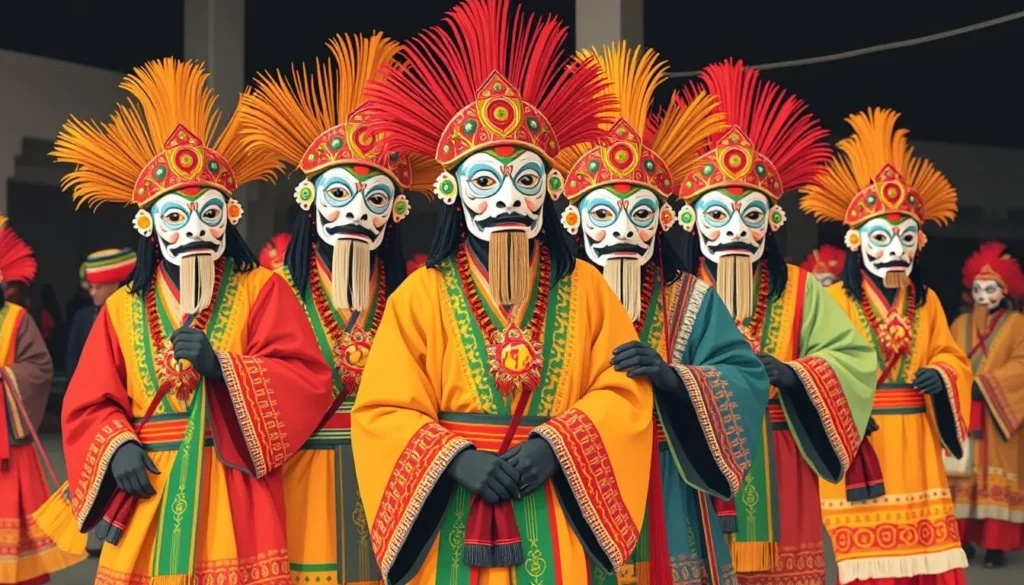
Surva Festival in Pernik: Bulgaria’s Most Famous Kukeri Celebration
The Surva Festival, held every year in January in Pernik, is a highlight of Bulgaria’s festival calendar. This festival is a spectacular display of Slavic practices and folklore, where participants, known as Kukeri, wear elaborate masks and costumes to festivities that ward off evil spirits.
The event takes place over a couple of days, attracting visitors from around the world who come to witness the vibrant processions and ritual performances. It’s a truly immersive experience, allowing you to delve into Bulgaria’s tradition and cultural identity.
Local Kukeri Traditions: Kukerlandia in Yambol
For a more intimate Kukeri experience, you might prefer Kukerlandia in Yambol, which offers a locally-focused celebration. This festival typically occurs in February or early March, aligning with the ancient pagan calendar’s celebration of spring’s arrival.
Each participating village brings its unique style of masks and costumes, showcasing the diversity within Bulgaria’s Kukeri tradition. The ritual performances, including symbolic acts of plowing and harvesting, highlight the community’s connection to the land and their agricultural heritage.
By attending Kukerlandia, you’re not just witnessing a festival; you’re participating in a living, breathing cultural practice that has been preserved through generations.
Spring Awakening: Celebrating Nature’s Rebirth
The arrival of spring in Bulgaria is celebrated with a variety of festivals that showcase the country’s deep-rooted traditions. As the country awakens from its winter slumber, the air is filled with the sounds of folk music and the scent of traditional foods, creating a vibrant atmosphere that attracts visitors from all over.
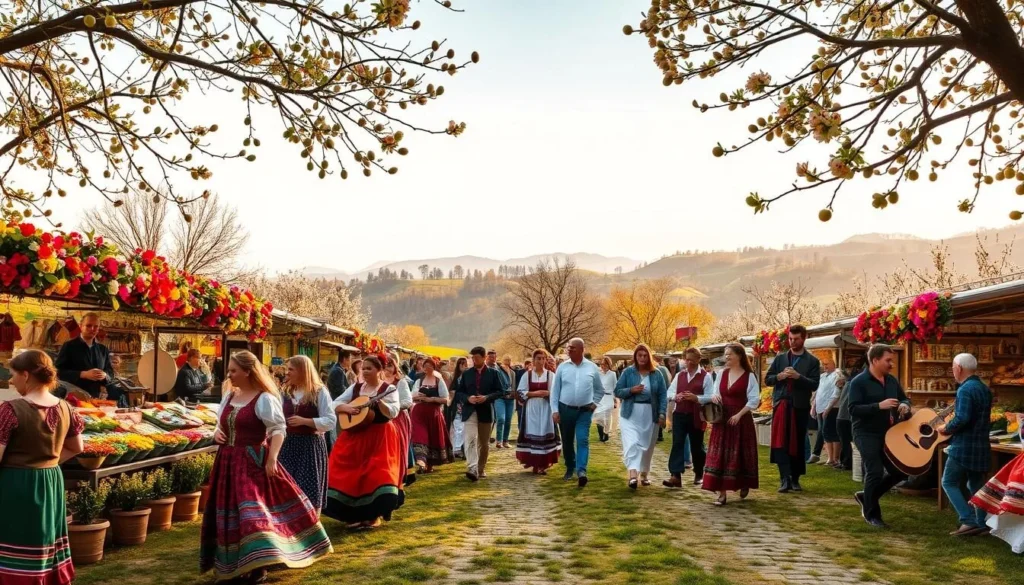
St. Lazarus Day: Traditional Folk Celebrations
On April 12, Bulgaria celebrates St. Lazarus Day, a significant event where teen girls, dressed in traditional costumes, roam their towns singing folk songs. This ancient ritual marks the beginning of spring and is a cherished tradition. The girls’ songs are believed to bring fertility and good fortune to the community, highlighting the importance of this day in Bulgarian culture.
Orthodox Easter Festivities Across Bulgaria
The Orthodox Easter Weekend, taking place from April 18-21, is one of the most important religious festivals in Bulgaria. The celebrations blend Christian traditions with ancient spring fertility rituals, creating a unique cultural experience. During the Holy Week leading up to Easter, numerous church services are held, with the midnight service on Saturday being the most attended.
- The tradition of egg-dyeing on Holy Thursday symbolizes Christ’s blood and is believed to bring health and protection to children.
- Easter bread, known as kozunak, is a sweet bread with raisins that families prepare together, with each region having its own variation.
- Easter Monday is marked by visits to cemeteries, where families honor deceased relatives, bringing colored eggs and kozunak to share at the gravesites.
| Event | Date | Description |
|---|---|---|
| St. Lazarus Day | April 12 | Teen girls in traditional costume sing folk songs. |
| Orthodox Easter Weekend | April 18-21 | Celebrations including church services and traditional foods. |
| Holy Thursday | During Holy Week | Tradition of egg-dyeing. |
| Easter Monday | Easter Monday | Visits to cemeteries to honor deceased relatives. |
These spring festivals in Bulgaria offer a unique glimpse into the country’s rich cultural heritage, making them a great place to experience the local tradition and events.
The Festival of Roses in Kazanlak
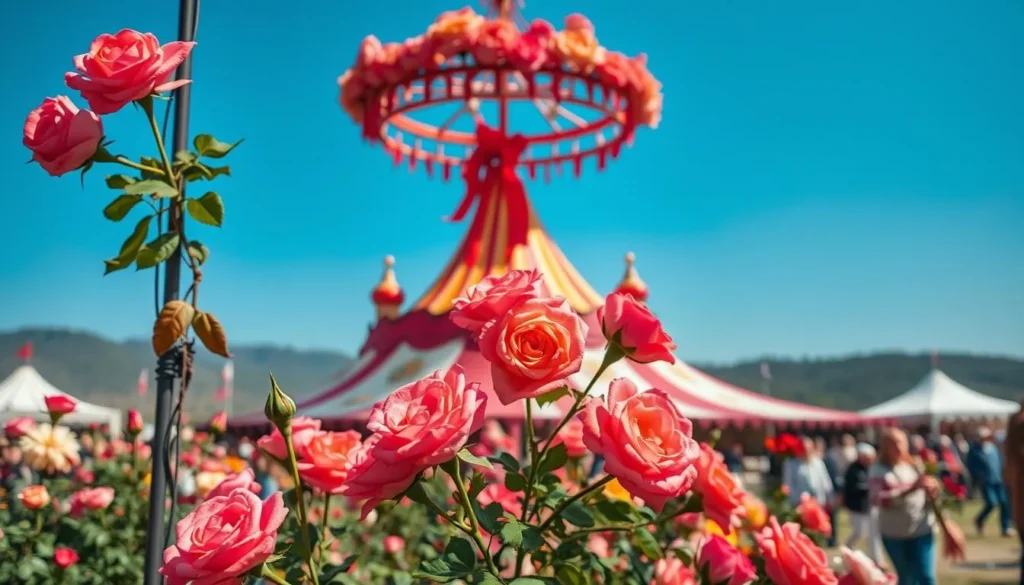
In the heart of Bulgaria’s Rose Valley, the Festival of Roses in Kazanlak is a must-experience event for any traveler. This world-famous festival takes place in the first week of June and is a celebration of the beauty, fertility, and cultural significance of roses in the region.
The Festival of Roses has a rich history, dating back to 1903, making it one of the oldest festivals in Bulgaria. It is a blooming celebration of the Bulgarian rose-growing industry, where Kazanlak and nearby villages come together to display their roses through parades, art exhibitions, and more.
Rose Picking Rituals and Oil Extraction Ceremonies
One of the highlights of the festival is the traditional Rose Picking Rituals and Oil Extraction Ceremonies. Visitors can witness the meticulous process of rose harvesting and the traditional methods used for extracting rose oil, a process that has been passed down through generations.
The Rose Museum in Kazanlak provides valuable insights into the history and significance of rose cultivation and oil production, showcasing artifacts that date back centuries. This adds a layer of cultural depth to the festival, connecting visitors with the heritage of the region.
The Royal Rose Parade and Cultural Events
The Royal Rose Parade is the festival’s grand highlight, featuring elaborately decorated floats, folk dance ensembles, and the crowning of the Rose Queen. The parade takes place on the first Sunday of June, attracting thousands of spectators from across Bulgaria and international visitors.
Throughout the festival week, Kazanlak hosts a variety of cultural events, including art exhibitions featuring rose-themed paintings and photography, concerts of traditional Bulgarian music, and folk dance performances. Visitors can also indulge in culinary events that showcase rose-infused products, such as jams, liqueurs, and the famous Bulgarian rose lokum (Turkish delight).
Early Summer Festivals Along the Black Sea Coast
The Bulgarian Black Sea Coast comes alive in early summer with a variety of festivals that showcase the country’s rich cultural heritage. As you visit Varna, the largest city on the Black Sea Coast, you’ll find a plethora of cultural events that make the most of the summer season.
Varna Summer Festival: Music, Theater and Arts
The Varna Summer Festival is a highlight of the early summer calendar, featuring a rich program of theatre plays, operas, ballet performances, and jazz competitions that run from June to August. You can enjoy the Varna Summer Jazz Festival, which is a must-see event if you’re in Varna during the summer. The festival also includes the Varna Summer International Music Festival, which takes place from mid-June to September and showcases classical music performances. With its diverse lineup, the Varna Summer Festival is an excellent way to experience the city’s vibrant cultural scene.
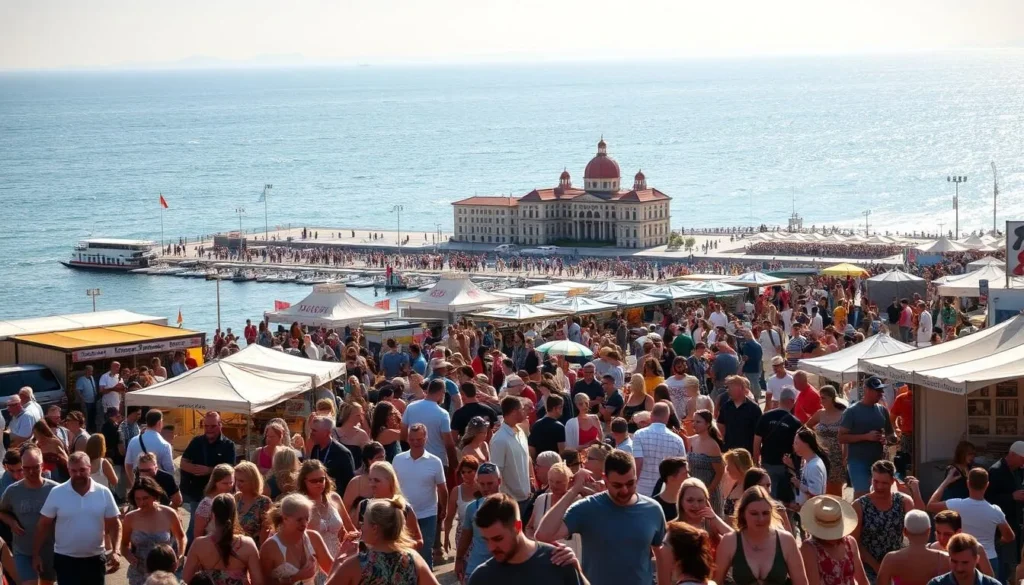
July Morning: Bulgaria’s Unique Seaside Celebration
July Morning is a uniquely Bulgarian celebration that takes place on the night of June 30th into the morning of July 1st. Thousands gather on beaches along the Black Sea coast to welcome the first sunrise of July. This tradition, which began in the 1980s as a form of peaceful rebellion against the communist regime, is inspired by the Uriah Heep song “July Morning.”
The celebration is characterized by spontaneous gatherings where people bring guitars, drums, and other instruments to play music throughout the night, culminating in the collective experience of watching the sunrise over the Black Sea. The most popular location for July Morning is Kamen Bryag (Stone Shore), where the legendary John Lawton, former vocalist of Uriah Heep, has occasionally performed the iconic song as the sun rises.
- A blend of hippie culture, Bulgarian freedom spirit, and summer beach party.
- A unique cultural phenomenon that attracts both locals and international visitors.
- A celebration of freedom and new beginnings.
By attending these festivals, you can experience the best of Bulgarian culture and enjoy the beautiful Black Sea Coast.
Bulgaria: Top Festivals to Check Out When Visiting During Summer
Bulgaria’s summer festival season is a treasure trove of unique cultural experiences waiting to be discovered. As you plan your visit during the warmer months, you’ll find a plethora of events that celebrate the country’s heritage, music, and traditions.
Cherry Festival in Kyustendil
The Cherry Festival in Kyustendil is a sweet celebration that takes place in June when the cherry trees are in full bloom. You can join in and pick cherries from the trees, or simply enjoy a glass of cherry brandy and watch the festivities unfold. This popular event, celebrated since 1981, is a great way to experience the local culture and taste the sweetness of summer.
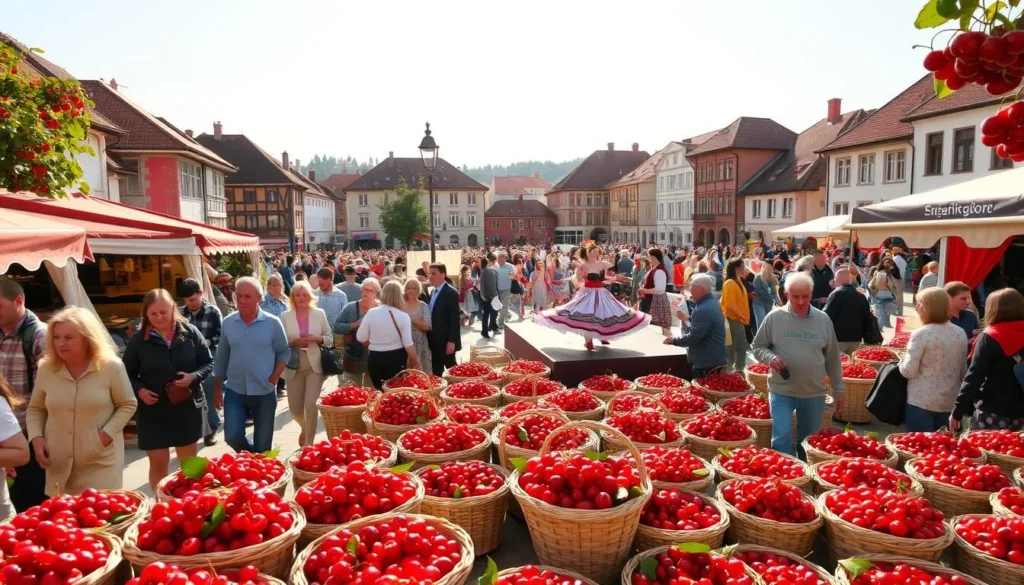
Nestinarstvoto: The Ancient Fire-Dancing Ritual
Nestinarstvoto is an ancient fire-dancing ritual that has been taking place in the Strandzha Mountains for centuries. This sacred ceremony of purification celebrates the strength and resilience of nature. You can witness this unique tradition and experience the spiritual connection of the participants as they dance on hot embers.
International Bagpipe Contest in Gela
The International Bagpipe Contest in Gela brings together bagpipe players from across Bulgaria and around the world. Held in early August in the mountain village of Gela, the festival features solo performers and ensembles competing in different age categories. You can enjoy the powerful sound experience of dozens of bagpipers playing together, creating a memorable experience.
| Festival | Location | Time |
|---|---|---|
| Cherry Festival | Kyustendil | June |
| Nestinarstvoto | Strandzha Mountains | Summer |
| International Bagpipe Contest | Gela | Early August |
These summer festivals in Bulgaria offer a unique opportunity to immerse yourself in the local culture, enjoy traditional music and dance, and experience the country’s rich heritage. Whether you’re interested in history, music, or simply enjoying the outdoors, there’s something for everyone during the summer festival season in Bulgaria.
Folk Music and Dance Celebrations
Immerse yourself in Bulgaria’s folk music and dance scene, a world of rhythmic expression and colorful costumes. Bulgaria’s folk festivals are a testament to its rich cultural heritage, showcasing traditional music, dance, and attire that vary across regions.
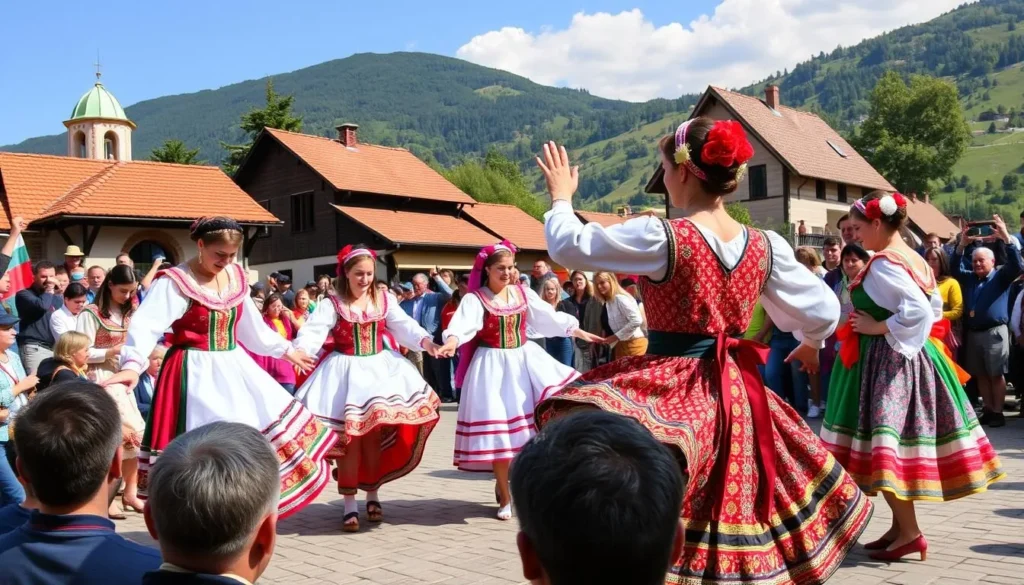
Pirin Sings Folklore Festival in the Mountains
The Pirin Sings Folklore Festival is a biennial celebration held in the picturesque Pirin mountain region. Locals gather to perform traditional songs and dances, wearing costumes from across Bulgaria, creating a vibrant display of the nation’s culture.
Thousands of amateur artists come together, painting the mountain landscape with their traditional attire and filling the air with beautiful melodies. This festival is one of the best music festivals in Bulgaria, offering a unique glimpse into the country’s folk traditions.
National Folklore Rozhen Festival
The National Folklore Rozhen Festival is a significant cultural event, held annually in the Rhodope Mountains. It’s Bulgaria’s largest gathering of folk musicians and dancers, with up to 100,000 visitors attending the event.
- The festival features multiple stages with competitions in instrumental music, solo singing, choral performances, and folk dance.
- Rozhen showcases Bulgaria’s diverse regional musical traditions, from the haunting sounds of the kaba gaida to the complex rhythms of Thracian music.
- Beyond the official program, the festival creates an impromptu marketplace where artisans sell traditional crafts and visitors can sample regional foods and drinks.
This event is a celebration of Bulgarian music and culture, making it a must-visit for anyone interested in music festivals in Bulgaria.
Art and Craft Festivals
As you explore Bulgaria, you’ll discover a variety of art and craft festivals that highlight the nation’s artistic talent. These events showcase the country’s rich cultural heritage and offer a unique experience for visitors.
Bulgaria International Fair of Arts and Crafts in Varna
One of the notable events is the Bulgaria International Fair of Arts and Crafts held in Varna during the entire month of August. You can easily find it by taking a stroll in Central Park. This festival brings together local and international artists, featuring a wide range of crafts and art installations.
The fair is an excellent opportunity to witness the creativity and skill of Bulgarian artisans. You can explore various stalls, admire the craftsmanship, and even purchase some unique souvenirs.
Sand Sculpture Festival in Burgas
Another popular event is the Sand Sculpture Festival in Burgas, which has become a major attraction on the Black Sea coast. The festival features massive sand sculptures created by international artists, with themes ranging from fairy tales to historical events.
The festival site covers over 9,000 square meters, with artists using more than 3,500 tons of special sand to create intricate art installations. Visitors can watch the creation process and marvel at the detailed sculptures, which are illuminated in the evening, creating a magical atmosphere.
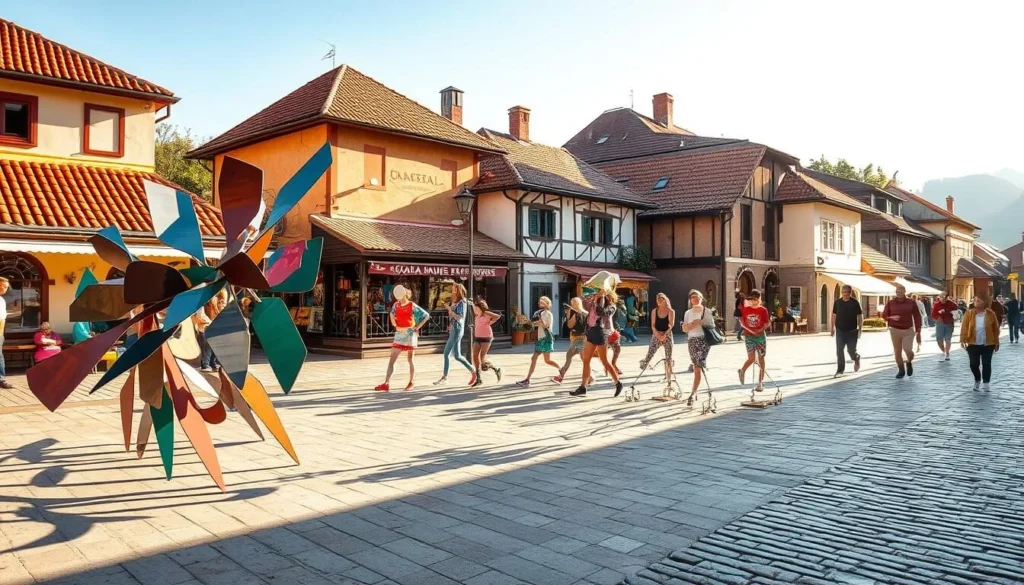
Visiting the Sand Sculpture Festival is a must-do when in Burgas. If you’re staying in Varna, you can easily take a day trip to Burgas, as it’s only a two-hour bus ride away.
Food and Culinary Celebrations
The flavors of Bulgaria come alive at its food festivals, where traditional cuisine meets modern creativity. You can experience the best of Bulgarian food and drinks at these vibrant events.
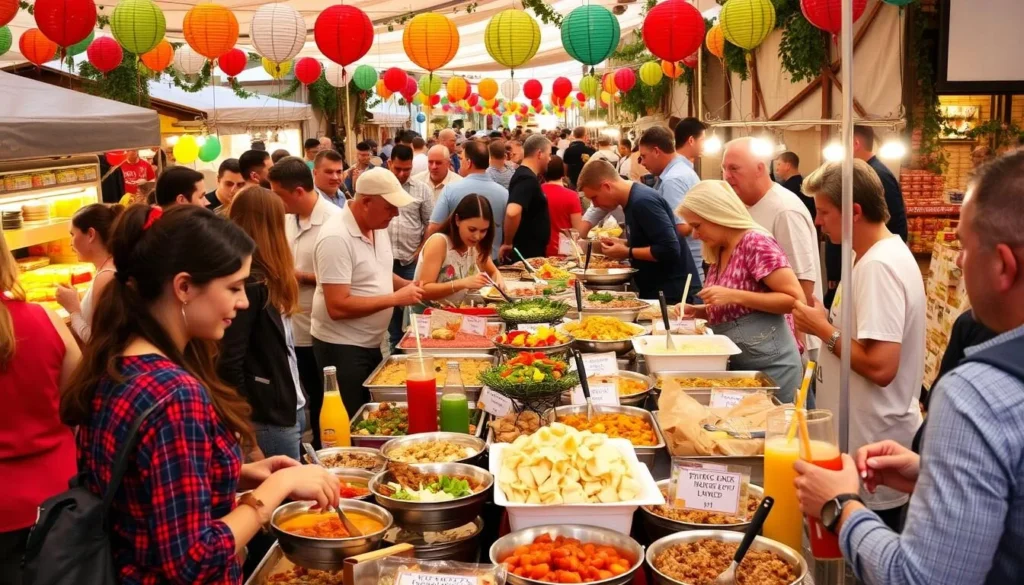
Street Food and Art Festival in Burgas
The city of Burgas hosts a newly established Street Food and Art Festival, bringing together the best street food vendors from around the country. You can enjoy a delectable smorgasbord of Bulgarian treats, from traditional banitsa to modern twists on classic dishes.
The festival is not just about the food; it’s also a celebration of art and music, with live performances and installations aimed at inspiring creativity. You can expect a lively atmosphere, with something for everyone to enjoy.
Bulgarian Plum Festival in Troyan
The Bulgarian Plum Festival in Troyan is a celebration of the region’s famous plum harvest and its transformation into delicious products like plum rakia (brandy). You can learn about the traditional methods of rakia production and taste some of the best varieties.
The festival includes culinary competitions, a marketplace with plum products, and cultural programs showcasing the connection between plum cultivation and local traditions. You can enjoy folk performances, exhibitions of agricultural tools, and demonstrations of traditional harvest methods.
Traditional Costume and Heritage Festivals
Experience the authentic charm of Bulgaria by attending one of its many traditional costume and heritage festivals. These events are a vibrant display of the country’s rich cultural heritage, showcasing the unique traditions and customs of its diverse regions.
Bulgarian National Costume Festival of Zheravna
The Bulgarian National Costume Festival of Zheravna is a highlight of the country’s cultural calendar, featuring an array of traditional costumes, or “Nosia,” from various regions. You can marvel at the intricate designs and colors of these costumes, which reflect the country’s history and cultural identity. The festival is a celebration of Bulgaria’s heritage, with locals and visitors gathering to appreciate the beauty of traditional attire.
Local Heritage Celebrations in Bulgarian Villages
Bulgaria’s villages are home to unique heritage celebrations known as “sabori” or gatherings, which often coincide with the village’s patron saint’s day. These local festivals preserve traditions specific to each village, including distinctive dance styles, songs, costume elements, and culinary specialties. You can experience Bulgarian hospitality at its most authentic by participating in these intimate celebrations, where you are often invited to join in dances and share in traditional meals.
| Festival | Location | Features |
|---|---|---|
| Bulgarian National Costume Festival | Zheravna | Traditional costumes, folk dances, local cuisine |
| Local Heritage Celebrations | Bulgarian Villages | Village-specific traditions, communal meals, agricultural rituals |
By attending these traditional costume and heritage festivals, you can gain a deeper understanding of Bulgaria’s rich cultural heritage and the significance of these events in preserving the country’s traditions.
Urban Cultural Events in Bulgarian Cities
From music festivals to art exhibitions, Bulgaria’s urban cultural events offer a unique experience for visitors. As you explore the country’s vibrant cities, you’ll discover a diverse range of cultural activities that showcase Bulgaria’s rich heritage.
Kvartal Festival in Sofia
The Kvartal Festival is a highlight of Sofia’s cultural calendar, transforming the city into a hub of music, art, and cultural events. Known as a “Cultural encounter with Old Sofia,” this festival brings new life to the city’s historic areas, making it a must-visit event.
Apollonia Festival of Arts in Sozopol
The Apollonia Festival of Arts in Sozopol is another premier cultural event, turning the ancient coastal town into Bulgaria’s cultural capital for ten days. Named after Apollo, the Greek god of music and poetry, the festival features a wide range of artistic performances, including classical and jazz concerts, theater performances, and art exhibitions.
The festival’s unique setting, with events taking place against the backdrop of Sozopol’s medieval churches and Thracian ruins, creates a truly immersive cultural experience. Visitors can enjoy world-class cultural events without the crowds of high summer, while still enjoying the warm weather and sea swimming.
Practical Tips for Festival-Goers in Bulgaria
To make the most of your festival experience in Bulgaria, it’s essential to be prepared. Bulgaria hosts a wide range of festivals throughout the year, each offering a unique cultural experience. Before planning your trip around a festival, verify the festival dates at the festival’s website or with a local tourist information office.
What to Pack for Bulgarian Festivals
When attending a festival in Bulgaria, what you pack can significantly impact your experience. For most festivals, comfortable clothing and shoes are a must, as you’ll likely be standing or dancing for extended periods. Depending on the time of year and the country‘s weather conditions, you may also want to bring layers for cooler evenings or rain gear. Don’t forget to pack essentials like sunscreen, a hat, and water to stay hydrated.
Transportation and Accommodation During Festival Season
Planning your transportation and accommodation in advance is crucial, especially for major festivals in smaller towns. Booking your accommodation early is advisable as options can be limited and fill up quickly. Consider staying in nearby larger towns if festival accommodations are full or overpriced, as Bulgaria’s relatively small size makes day trips feasible. For rural festivals, check bus and train schedules carefully, or consider renting a car for maximum flexibility.
| Festival Location | Accommodation Tip | Transportation Tip |
|---|---|---|
| Smaller towns like Koprivshtitsa or Zheravna | Book early as options are limited | Check bus schedules or rent a car |
| Urban festivals in Sofia, Plovdiv, or Varna | Consider location relative to festival venues | Use public transportation or plan for parking |
Conclusion: Experiencing the Heart of Bulgarian Culture Through Its Festivals
Experiencing Bulgaria’s festivals is akin to uncovering the layers of a rich cultural tapestry that defines this Balkan nation. Bulgaria’s festivals offer travelers a unique window into the soul of the country, where ancient traditions continue to thrive alongside contemporary cultural expressions.
The diversity of festivals in Bulgaria reflects the country’s rich regional identities, from the mystical fire dancers of the Strandzha Mountains to the rose harvests of the Valley of Roses. By planning your journey around these festivals, you’ll experience the country at its most vibrant and authentic, connecting with local communities and participating in celebrations that have defined Bulgarian identity for centuries.
Whether you’re drawn to the pagan spectacle of Kukeri festival celebrations, the sensory delights of culinary events, or the artistic richness of urban cultural festivals, Bulgaria’s festival calendar offers year-round opportunities for meaningful cultural immersion. As Bulgaria continues to emerge as a destination for culturally curious travelers, its festivals remain refreshingly authentic, offering genuine connections with one of Europe’s most fascinating cultures.
The above is subject to change.
Check back often to TRAVEL.COM for the latest travel tips and deals.
